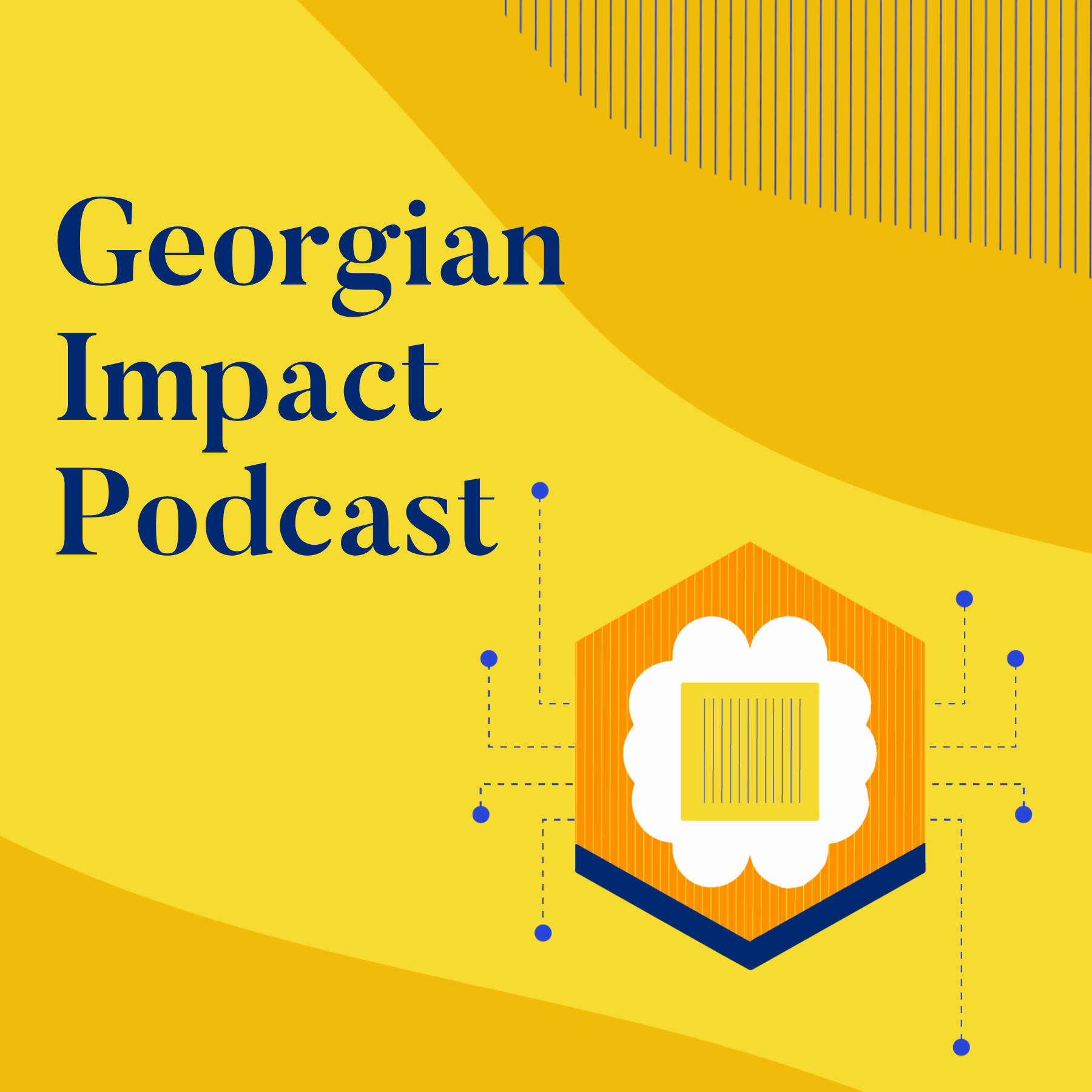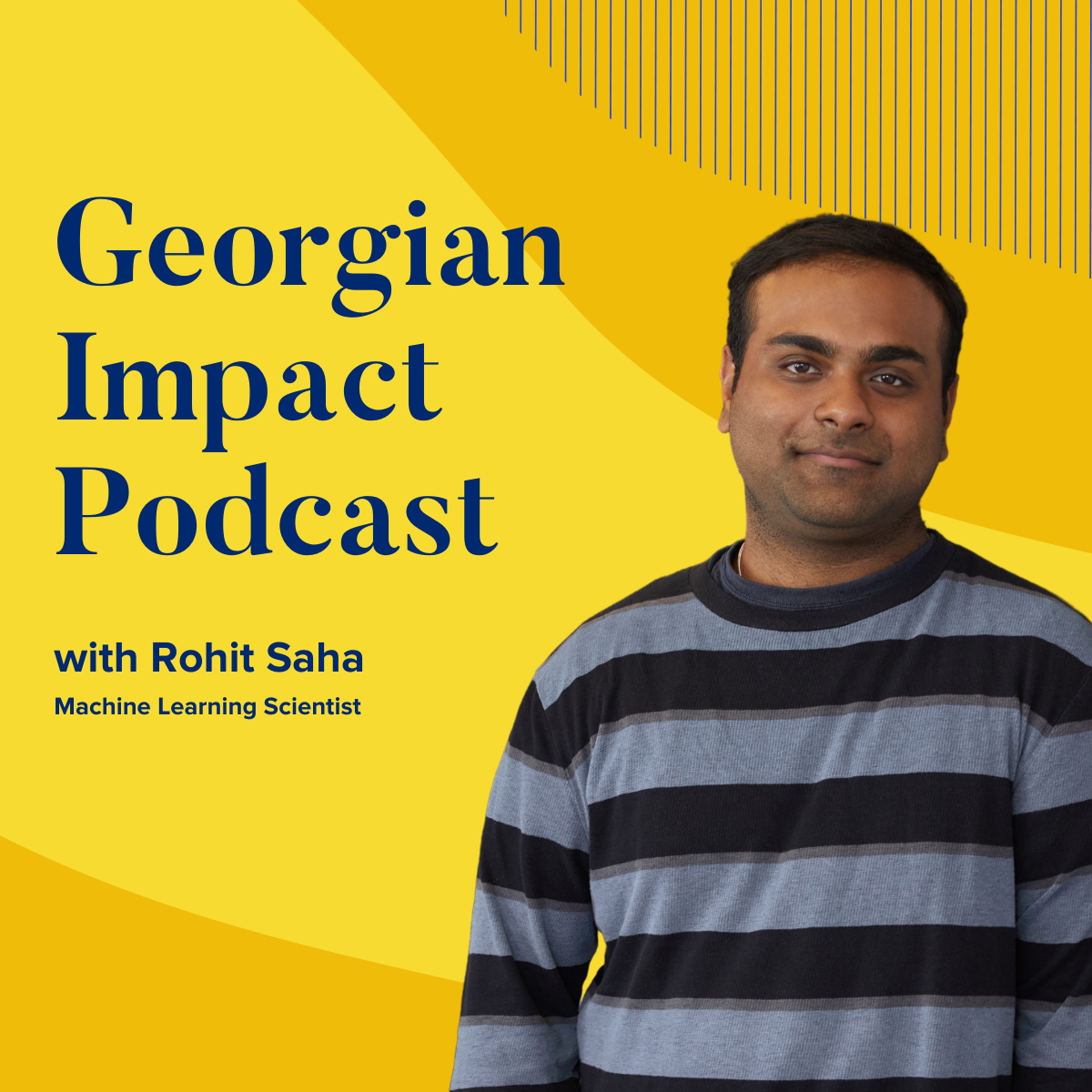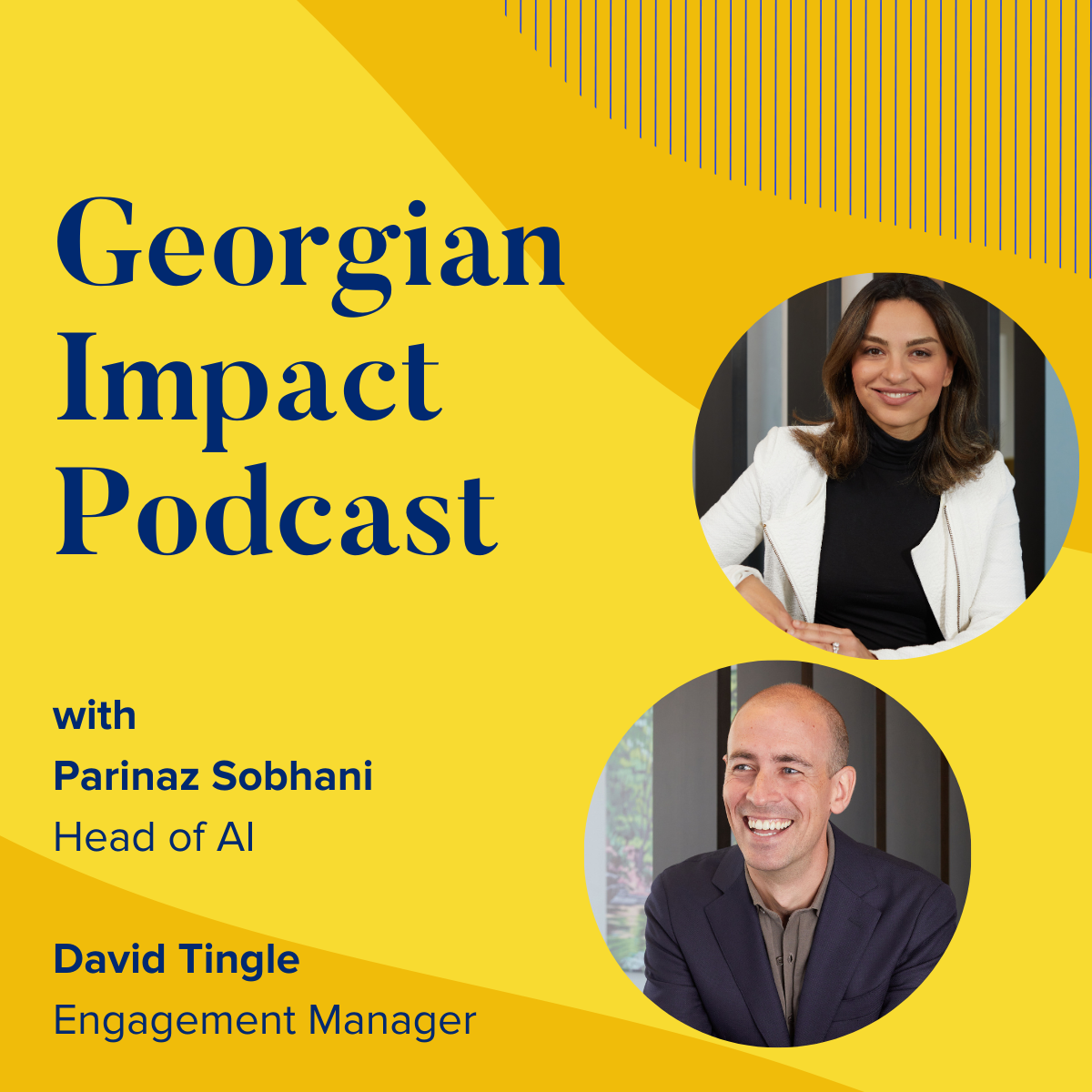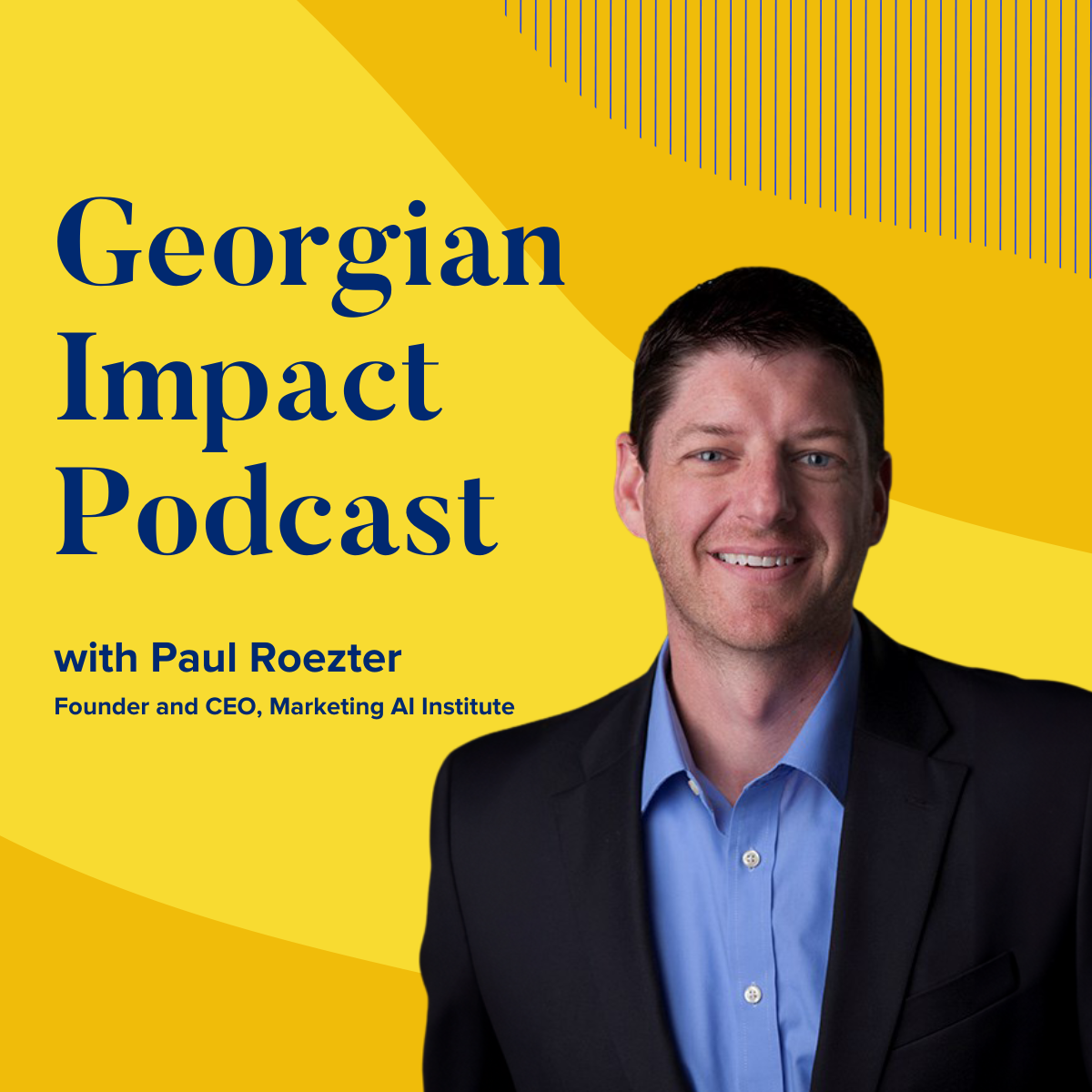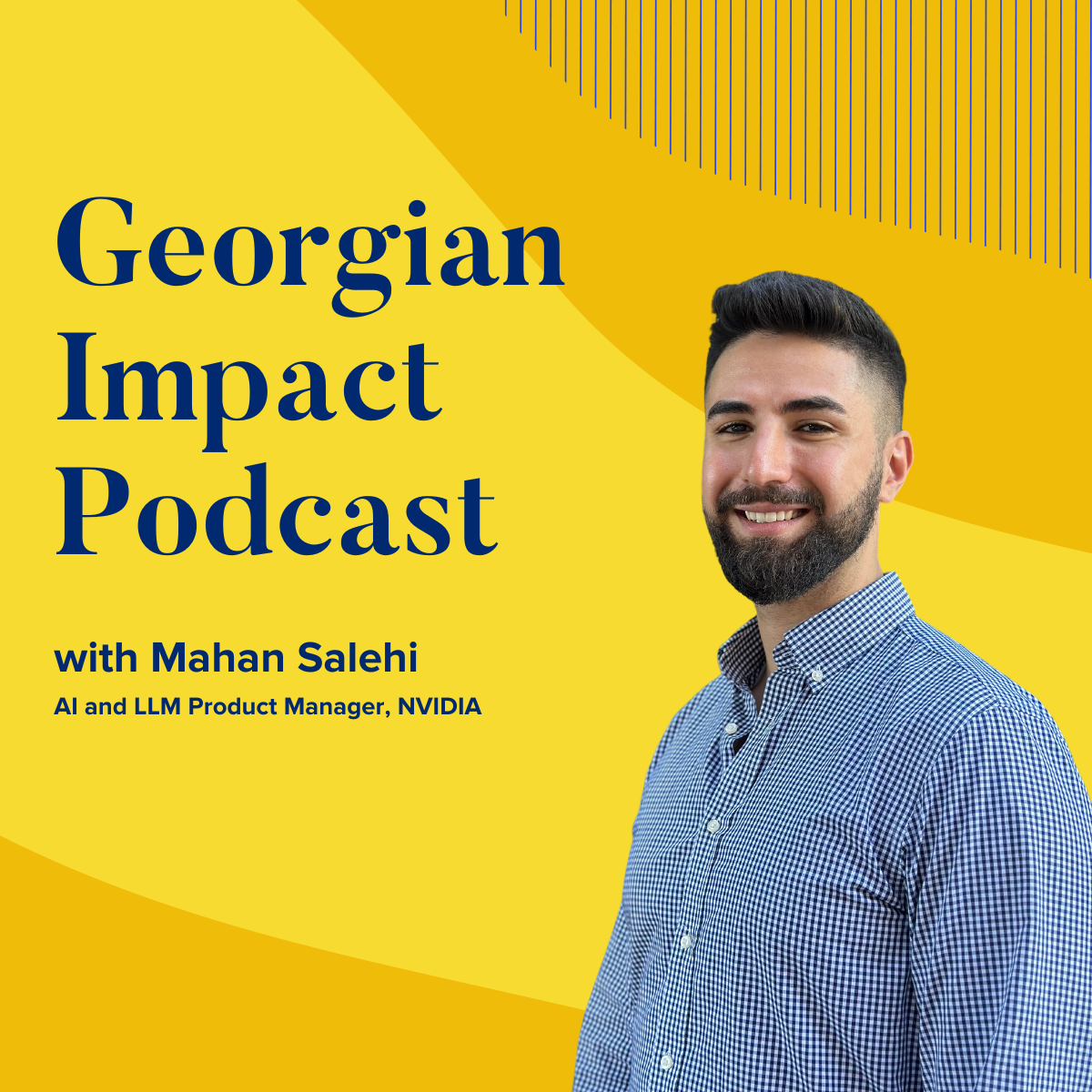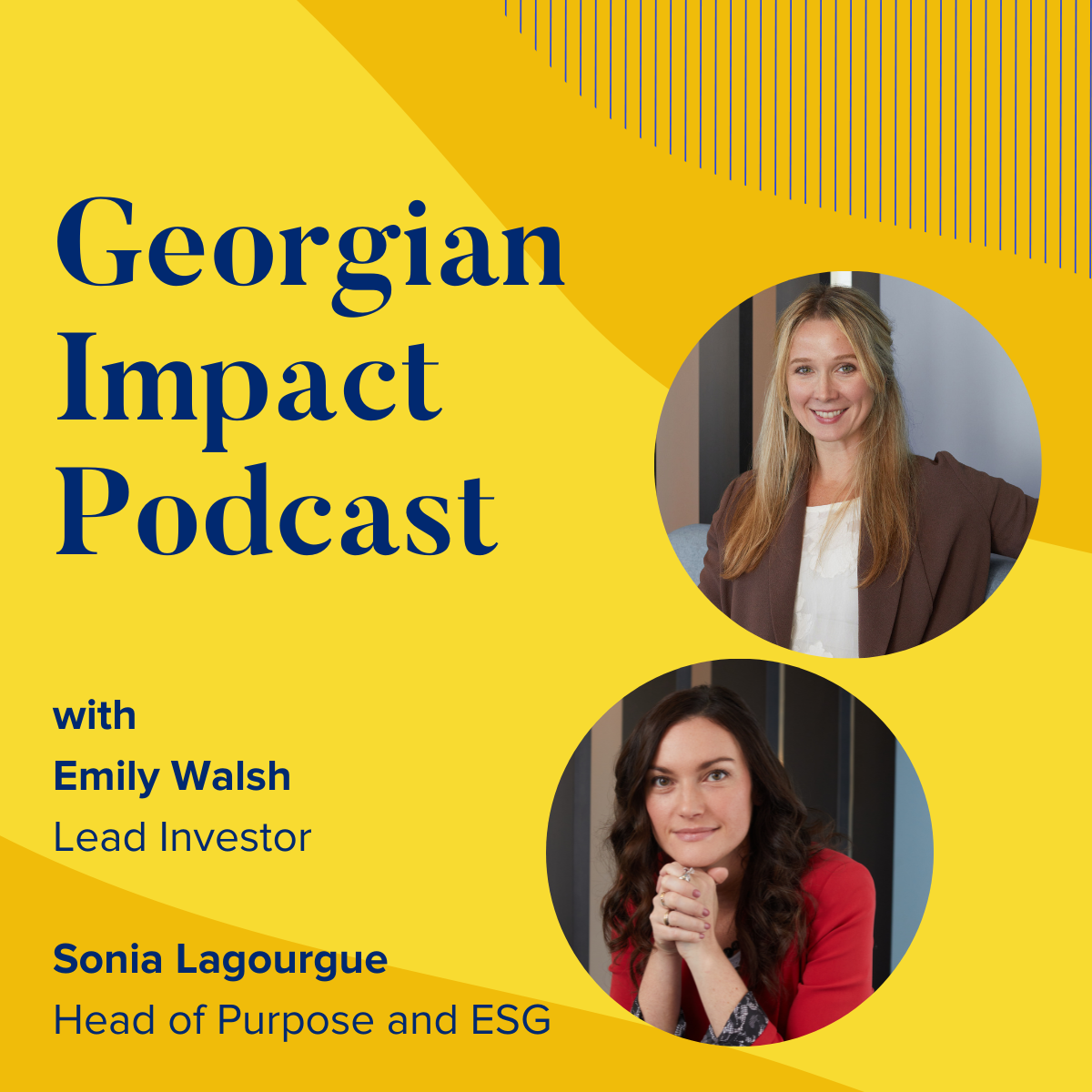Episode 115: Ghost Work: the Hidden Workers of AI
- 0.5
- 1
- 1.25
- 1.5
- 1.75
- 2
The gig economy we know what that means Outsourcing jobs. We know what that means working remotely. We know what that means. You put it all together. What do we have? I don't know a recipe for disaster for workers may be great profits for companies while you're nothing is ever that black and white. I'd like to argue that we have an opportunity and this is an opportunity for you and your company to separate yourself from your competition. I'm John Pryor and welcome to the Georgian impact podcast.
Today will be talked with Mary Gray a fellow at the E J Safra Center for ethics and Harvard University and she's a senior principal research with Microsoft research studies are technology transformed people's lives and is a leading expert in the emerging field of AI in Essex particularly researching Methods at the intersection of computer and social sciences. Mary Coop ghost work how to stop Silicon Valley from building a new Global under clips. And if you're growing your machine learning and AI Investments Mary's got some thoughts on the Bad and the good behind what type of workers in Workforce you might be needing. You could probably talk to your customers about the company you strive to be
Very welcome. I'd like to start by asking you about what's the biggest change with workers? I mean, we do have a history of task-oriented workers judicially working in factories. What's different today? Thank you. So, the biggest difference I'd argue is that we can now accelerate how many projects and tasks can be distributed at around the world. So the biggest difference when were thinking about peace work at that was critical to the growth of industrialization and Industrial Revolution impact in a textiles and across factories was it you always had this bit that needed to be done by people because the technology wasn't quite there the difference today is that the human in the loop is performing something that are really technically is beyond the capacity of the technology. The technology were dealing with today is artificial intelligence. But at the end of the day the value is keeping a person in the loop, it's not
Necessarily waiting for the automation to replace them in some cases were building out replacing them. But now more often than not it's companies that are taking advantage of having a person performing the discrete moment of judgments or creativity or Insight that is distinctly human and that you're not giving it to one person you're giving it to me real people around the world to take a weighted response often. So it's a really different mechanism. That's that's quite distinct from this history has continuity has connection to that past but if the time in tirely different thing Tori and our economy, are you mentioned piece work and I think that's interesting these two elements of that so forget the factory and the people working nine-to-five with cars coming out of assembly-line. I'm going to go back to the Lower East Side where most of the garments in the world were made in the United States were made in this one ten block area and everybody did piecework in these tenements and somebody bra.
Physical materials to them so we have no physical material. We have more Intelligence being applied and probably more distribution is is that a fair characterization of this type of worker that you're talking about? I think so, but with some elements that weren't part of that early history, we're looking at a world in which anything anything that can be at least in Part Source scheduled manage shipped and billed through an application programming interface in the internet is up for grabs. So there's a benefit thing as opposed to a hundred people are making 300 shirts and he all they could be difference in quality in this particular case. I could have a hundred people doing the same thing and get more to do this great benefit to distribution and scale that you use the term ghost work and I eat my senses and this be my interpretation is that because they're far away and not thought of it because I'm aggregating and scaling all of the Zimbabwe certificate.
About the workers a little bit is that is that part of where you're going with this and actually are my co-authors Siddharth Saturday and I came up with that term as a provocation to we're not really describe a particular kind of work. These aren't Niche jobs were describing a reorientation. Ardhelia dismantlement of full-time employment a particular within information economies and seeing the task of acacian of work turning projects knowledge work into individuated projects and tasks. And in that world, the the more we erase or hide the value of a person in that moment of data management of handling. That's when this can this can fall into a world of ghosts work. These are not inherently bad jobs are not inherently good or bad is that we haven't collectively as a society come up with a way that we're going to Value human participation in this riori.
Patient the work that is not in one location. It's not for a single employer. It's not popping out of product. It is genuinely valuing something. But again, it's distinctly human a moment of insight. Sometimes that it might be several moments of inside but at the end of the day it's asking for judgement. It's asking for for creativity and that means that you need and want many people to take a look at what you are asking them to consider in evaluating. What's aggregate the value of what they have to offer it. So I don't want to go down the tube too deep down. He's got the negativity. This is not but taskrabbit worker who's willing to wake up at 3 a.m. And stand on line at Apple so that I can make it by me the next iPhone we would argue there's a direct connection between how do we value someone who is an incredibly an incredibly important part of delivering a service.
And I love the point out the example of task rabbit. In that case. It is absolutely in part sourced manage scheduled shipped and billed for an application programming interface in the internet and economically. How do we value that person who's been called to complete a task the very specific task that's online to offline.
And see their value within that moment of Service delivery. So there's two I can almost see to ask you see an x-axis and y-axis and one is repeatability and one is your individuality and then scale. So the not many people are going to hire somebody to wait on line. I shouldn't say that but waiting for the iPhone is a bazillion. I am getting very technical now over drivers versus a Brazilian Facebook curators looking for objection of a material. So there there's the difference and as we move up that particular access and obviously that also takes it up the scale access. We now have different types of impact to the workers and if there's a thought of as ghosts then you begin to think less about them as people versus if you're looking at all of the do people working on sewing clothing.
In the in the in a tenement building or showing shirts in the Shirtwaist Factory, you can look at them as a group of people. It's is it isn't hard as it is human nature to sort of forget them. I'm going back to the way you and your partner thought about this as ghosts work. I think it can be easier to forget them because of the speed of the transaction. I think it can be easier to forget them. If part of what is sold to us is the magic of software or the magic of a I so the thing to track in in this historical moment of the use of contract labor the use of contingent labor to fill what we call the Paradox of automations Last Mile to fill the gap between what a machine can do and what's distinctly are humans capacity that what's what's really shrinking is our ability as consumers of that service to see the effort to see the value of a person.
Tapping into the mall between what something computation can accomplish and what something at 8 only a human can do so, I'd like to talk about this automations Last Mile a bit. I'll give you a couple examples come to my one. I'm super great with AI making people better at what they do. I love the concept of a doctor working with me. And then the doctor my turn to a screen is a basin. All the data is a 50% chance. It might be this a 20% chance and they still judgment from the doctor said that there's Tech helping that.
Describing me more about this last mile. And then what what you think that we can see applications of artificial intelligence that could be in credibly beneficial about the patient and the clinician who's who who wants more information aggregated for them in the moment to help evaluate. What's the best I can do you to intervene and support this patient. We can all picture that the things that get murky are not always a very explicit claim claims that somehow the ability to have a have a I effectively look at a cyst or a DOT on your skin and evaluated quickly and work that's strictly machine learning at work and not recognizing how much human energy went into looking at structuring the data of many many examples of a boy.
Wishes on the skin and skin cancer and evaluating margins of of those kinds of marks people are doing that annotation doing the data work to be able to come up with accurate Diagnostics. And what we know is the technical challenge of constantly figuring out. Okay, low-hanging fruit here is a kind of image that is really clearly skin cancer move it up a notch. I'm going to start evaluating more complicated diseases diseases that are less common diseases that have star much more variation. Those are places where we know we're going to continue to need humans in the loop doing that data analysis that then they can assist the clinician but there's never a moment in which it's just a clinician now working with automation delivering a service to a patient that there's a there's a full
Full stack of human participation and creativity going into improving may I be able to deliver those Diagnostics? So there's two pieces of that one is the labeling and obviously we and I think you've been does a lot of focus on what that means and how to get that labeling right? But there's also and this is a and I'm not sure this is a focus of the book when I'm going to throw it out cuz it's so important to our audience is making sure the day to coming in to drive. This is not biased exactly and I think this is where computer science and engineering is literally just coming to grips with realizing the limits of training data and having a look at their training data what they're using the train Ai and knowing that that when you don't start with a diverse and inclusive training data set you end up overfitting a model which means you cancer patients who look like anything other than what was in the training data that will persist as a problem to solve with in healthcare.
If you're a solvable, it means constantly bringing more people more samples into your training data.
But that also means constantly updating our models and requires human inside to be able to do that annotation. Every time we nail it with a really limit, you know, fairly homogeneous training data set we realized. Oh we want to be able to apply it to far more people too far more contacts and that is really the most important element has to think about how contextual how much contacts location the bodies in the room matter to the kind of problems were often trying to solve with artificial intelligence. And as long as context matters as long as language matters, as long as cultural specificity matters think localization, as long as localization is key to your business impact, we will always need more eyes on a particular problem to make sure it's as diverse and inclusive as possible. It's is really not about getting the bias out. It's literally about accepting.
My ass is always part of what we produce when we produce training data right now. It's not the necessarily where we're going with all this is a bad thing at all. People used to working call centers nine-to-five boiler rooms, and now they could be working at home taking calls from 9 to 5. So your concern is not the nature work is changing your concern on how we approach this work is that fair everything? We've built to support working people was built around a model that assumed a 9 to 5 shift job in a factory in terms of our social safety net. We actually never built out of social safety net for the professions because we imagined everybody who has a college degree who's part of the Learned societies of doctors lawyers Educators clergy would never ever need a a real social safety net because they were buffer.
By what was unique about their creativity will guess what? When we Orient to a project a space world, there's tons within the creative world. That's also route that can be modeled as a computational process. So for example and legal services, there is a lot of legal service work paralegal work that can be automated. I can start searching for terms. I can start looking for a certain sets of markers. So I don't need a paralegal or a lawyer in a first-year to be going through that material. But just as every technological innovation has done that means you're opening up possibilities for other kinds of work to to come to the fore other markets to organize. And so the challenge here is that we built our social safety net around working people with the idea that the people who need it most are in a jar on the factory floor.
Haven't rebuilt our social safety net rethinking. How do you protect people if they're not on one single work site? They work for many employers many employers are Brock. And in many ways their value is not what they individually bring to the table. It is that they are contributing as part of an aggregated group of people to a particular project. You mentioned social safety net and it's it's obviously going to change that won't be necessary unemployment insurance with people in a gig economy work. So what do you mean? What do you see the future of a social safety net and what should companies and employees be advocated for by the end of the chapter on the double bottom line. We realized as hard as these companies are fighting to set a bar instead of standard and in many ways bring the value proposition. They get in a long-term investment in
Sustainability for their workers that there's limits to what one company can do and I think we look the bigger picture if we look at the history of employment. It really took business interest private sector the workers themselves advocating for their needs and government to step in and build the social safety net that made textile mills safe. So it may be working habitable. You know, that's where our weekend comes from. It's not because business has decided that it was a boon to give workers the weekend off. So, you know, I think arguably to rebuild this to rebuild the social safety net is to recognize that this is going to be rebuilding something that has to have all the stakeholders at the table. It's bringing government to the table bring a private-sector and public-sector interest and workers needs to rethink.
What does unemployment mean in at a space world? What does social what does the office of Health and Human safety mean in at a space world? So we leave you with a little nugget by the end of my fieldwork what really struck me was how many workers have created home offices for this work that that is a public health nightmare with the desperate need for making sure in the pie in the interest of public health and safety that were thinking about these new sites of work as places that also need protections so that the workers can come back in and work another day. So all of of what we take for granted as the social contract, we have between employment and workers. I believe that that needs to be rethought. So let's talk to CEO had on a bit and you talk about the double bottom line.
Cisco games as well as positive social impact. I think that's exactly we getting closer talk to me about some companies may have done that. Well what you put your research has yielded. So I studied for different platforms to be stand-ins for the range of tasks based work that's out there and really different approaches just more business models for how to organize this work and to the companies that we studied one is Lee genius as a social entrepreneur start-up that this premise was we're not going to sell you that the software some magic. It's really the people and they rented their process is around team-based approach has it really took advantage of the fact that harnessing people's collaboration was going to be the best way to generate sales leads. So they start with the kind of mishmash of unstructured data, you can get when you scrape the web and they're offering a really smart business to business opportunity, which is I will give you the best
Hopefully it's the way they do that is Source it to a group of people who exactly fan out across the web and figure out what are the best Lee's and they're taking their taking a weighted response from their team members. Sure. So we think are are the best set. So that's what that's one good example. I think of what does it look like to have a business-oriented around this what makes up the double bottom line is that they are interested in growing that business both so that they can serve as many different sales approaches and knees and environments as possible cuz selling air conditioners is very different than you know, even copy paper. So realizing different companies have different needs a building out their capacity to serve many different businesses and also recognizing that to do that. They have to have a sustainable worker pool treat their workers for the value that they are as a common. It's it's literally a group of people who may come and go their value.
Isn't it being retained as a full-time employee? It is literally in saying we're going to let you set your schedule. We're going to give you a list of tasks what kinds of tasks and projects. Do you want to sign up for recognizing that I am an Aficionado when it comes to a particular business need I'm going to do a better job if I'm interested in selling sports equipment versus selling technology odds are pretty good. You're going to get more out of me as a worker. So we need to recognize different skills do different pieces and not everyone. It's it's when you think of the old fashion manufacturing tops and bottoms everybody is replaceable. This is not the case you want to actually learn more about skills and a you'd mentioned earlier Healthcare, but it's really much much beyond that. This is an issue of managing projects and giving them flexibility in scheduling and managing your macro level company knowing that your diverse
Very scattered work for us can support you but you got to get this is anybody figured out how to manage all that yet. I think they're coming pretty close considering and another company. We studied called Mara that does captioning in Translation work for video specifically, which is technically incredibly hard problem. So picture scenario where you want to have a multilingual conference event and have have it live streamed and be able to have linguist be able to provide, you know you and level quality translation and cat so that people can equally participate that's the kind of business solution that you can only get by mixing people in the loop and the Effectiveness and efficiency the quickness you can get from a computational process with bacon as a team be able to look at Material translate it simultaneously and collectively be able to mix
Here's the best translation and doing that in real time. You'll be able to do that without much lag as an incredibly valuable value proposition. There's no way to do that with a full-time Staffing because to build out the language capacity alone. You would have to have so many people that are are effectively going to be idle. And what were all all grappling with is, how do we make sure somebody's going to be available tomorrow when I need Spanish and instead of Portuguese, right as I've got a list of 50 and tomorrow at 10 p.m. I need this and I'll send out with some notice or request that this is needed and you'll get people that way this is I think the thing that everybody is missing that I I believe that the research we did because of the way we did it. We were doing qualitative research mixed with quantitative measurement of these labor markets.
Please work environments and we were doing really detailed fieldwork at interviews with the people doing the work that we could see there's a real credit distribution of participation. So the magic the what what allows these markets to really Thrive are conditions that equip the platform company is likely genius and tomorrow to put out an open call because here's what you get. When you get an open call you get the score group of people call them always on who are deeply committed for for many reasons, but they have a deep commitment to turning this into effectively a full-time income stream that core group of 20% or so there they are doing The Lion's Share of work in those environments just as importantly there's a deep bench of a good 35% of people. We called regulars who are coming and going and they've picked really precise hours and projects and interest that
You can rely on them. And the thing that makes this functional for them is precisely that this isn't what they do all all the time. They they don't make it always on and then there's a long tail most of the people adding value here are the people who can create a sense of abundance that you have a market that can pick up any project any moment. It's a long tale of experimental. It's folks to come in and do one or two projects. They bring incredible value to everybody in this equation because it means that any moment I literally as a consumer or business can open up an application go to that platform company and find somebody to meet my need to have a long time before for a CEO then it makes an awful lot of sense to focus on the benefits to your company recognizing what this Workforce looks like recognizing the astrology this week.
Wire to pull this out you end up with happy workers with some good work-life balance. They have chosen the burden of work and they want you as a CEO have the burden and responsibility to all your workers into your company and you end up with a win-win for all so I I think we're on the great the great past the platforms that were really knocking it out of the park where the ones who very consciously intentionally prioritized three needs that would cut across the board for all workers. It was controlling their time controlling the choice of projects and controlling their collaboration the companies that try and fix the hours the companies that try to limit what kind of projects you can choose from or do you prioritize making that even possible for workers and the companies that just literally say, I don't want workers talking with each other that kills the quality of what you have because he's workers need to to connect and they do anyway, that was one of the biggest findings Ann Arbor.
Every case workers move off platform, so nobody can see they go to what is there water cooler, and they connect and they collaborate for really the Deep social need. We all have to connect with humans were working while a sea change is coming. Everybody better get a hold of it recognized and who you need in your office wearing about some macro level strategy pieces recognizing how technology changes what's required as you do training data as we get the more more ML and AI Solutions. I think we're on a great journey Mary Gray. Thanks so much at a pleasure talking with you today. My pleasure. Thank you, John.
DESCRIPTION
The Gig economy. We know what that means. Outsourcing jobs. We know what that means. Working remotely. We know what that means. But what happens when all three are combined?
Our guest on this episode of the Georgian Impact Podcast, Mary Gray, co-authored Ghost Work: How to Stop Silicon Valley from Building a New Global Underclass and if you are growing your Machine Learning and AI investments Mary’s got some thoughts on the bad and the good behind what type of workers and workforce you might be needing to be able to proudly talk to your customers about the company you strive to be.
You’ll hear about:
- The manual work behind many AI models
- A new model for employment relations
- How micro-employment platforms guarantee the skills you need
- How to do good by your contract employees
Who is Mary Gray?
Mary Gray is Senior Principal Researcher at Microsoft Research and a fellow at the E.J. Safra Center for Ethics Fellow and Berkman Klein Center for Internet and Society Faculty Affiliate at Harvard University.
Using the tools of anthropology and critical media studies, Mary looks at how material conditions and everyday uses of technologies transform people’s lives.
Her most recent book, "Ghost Work: How to Stop Silicon Valley from Building a New Global Underclass," co-authored with computer scientist Siddharth Suri, explores the lives of people paid to train artificial intelligence and, increasingly, serve as “humans in the loop” delivering on-demand services.
